Note
Click here to download the full example code
Music Source Separation with Hybrid Demucs
Author: Sean Kim
This tutorial shows how to use the Hybrid Demucs model in order to perform music separation
1. Overview
Performing music separation is composed of the following steps
Build the Hybrid Demucs pipeline.
Format the waveform into chunks of expected sizes and loop through chunks (with overlap) and feed into pipeline.
Collect output chunks and combine according to the way they have been overlapped.
The Hybrid Demucs [Défossez, 2021] model is a developed version of the Demucs model, a waveform based model which separates music into its respective sources, such as vocals, bass, and drums. Hybrid Demucs effectively uses spectrogram to learn through the frequency domain and also moves to time convolutions.
2. Preparation
First, we install the necessary dependencies. The first requirement is
torchaudio and torch
import torch
import torchaudio
print(torch.__version__)
print(torchaudio.__version__)
import matplotlib.pyplot as plt
2.3.0
2.3.0
In addition to torchaudio, mir_eval is required to perform
signal-to-distortion ratio (SDR) calculations. To install mir_eval
please use pip3 install mir_eval.
from IPython.display import Audio
from mir_eval import separation
from torchaudio.pipelines import HDEMUCS_HIGH_MUSDB_PLUS
from torchaudio.utils import download_asset
3. Construct the pipeline
Pre-trained model weights and related pipeline components are bundled as
torchaudio.pipelines.HDEMUCS_HIGH_MUSDB_PLUS(). This is a
torchaudio.models.HDemucs model trained on
MUSDB18-HQ and additional
internal extra training data.
This specific model is suited for higher sample rates, around 44.1 kHZ
and has a nfft value of 4096 with a depth of 6 in the model implementation.
bundle = HDEMUCS_HIGH_MUSDB_PLUS
model = bundle.get_model()
device = torch.device("cuda:0" if torch.cuda.is_available() else "cpu")
model.to(device)
sample_rate = bundle.sample_rate
print(f"Sample rate: {sample_rate}")
0%| | 0.00/319M [00:00<?, ?B/s]
5%|4 | 15.8M/319M [00:00<00:04, 77.8MB/s]
7%|7 | 23.2M/319M [00:00<00:06, 49.2MB/s]
10%|# | 32.9M/319M [00:00<00:06, 48.9MB/s]
15%|#4 | 47.6M/319M [00:01<00:10, 28.3MB/s]
16%|#6 | 51.2M/319M [00:01<00:11, 25.1MB/s]
20%|## | 64.9M/319M [00:01<00:06, 39.0MB/s]
22%|##2 | 71.1M/319M [00:01<00:06, 40.3MB/s]
26%|##5 | 82.0M/319M [00:02<00:05, 41.9MB/s]
30%|### | 96.8M/319M [00:02<00:04, 57.6MB/s]
33%|###2 | 104M/319M [00:02<00:04, 50.8MB/s]
35%|###5 | 113M/319M [00:02<00:05, 40.8MB/s]
37%|###7 | 118M/319M [00:03<00:05, 35.4MB/s]
41%|####1 | 131M/319M [00:03<00:04, 44.9MB/s]
46%|####6 | 148M/319M [00:03<00:02, 61.6MB/s]
50%|####9 | 158M/319M [00:03<00:02, 66.7MB/s]
52%|#####2 | 166M/319M [00:03<00:03, 49.8MB/s]
55%|#####4 | 175M/319M [00:04<00:02, 55.9MB/s]
57%|#####6 | 182M/319M [00:04<00:03, 47.7MB/s]
61%|######1 | 195M/319M [00:04<00:02, 57.7MB/s]
63%|######3 | 202M/319M [00:04<00:02, 56.2MB/s]
67%|######6 | 213M/319M [00:04<00:02, 54.7MB/s]
71%|#######1 | 228M/319M [00:05<00:01, 56.2MB/s]
73%|#######3 | 234M/319M [00:05<00:01, 50.3MB/s]
77%|#######6 | 244M/319M [00:05<00:01, 47.0MB/s]
78%|#######7 | 249M/319M [00:05<00:01, 45.2MB/s]
82%|########2 | 262M/319M [00:05<00:01, 49.8MB/s]
87%|########6 | 277M/319M [00:05<00:00, 63.2MB/s]
89%|########8 | 284M/319M [00:06<00:00, 57.6MB/s]
92%|#########1| 293M/319M [00:06<00:00, 64.3MB/s]
94%|#########3| 300M/319M [00:06<00:00, 61.0MB/s]
98%|#########7| 311M/319M [00:06<00:00, 57.7MB/s]
100%|#########9| 318M/319M [00:06<00:00, 56.4MB/s]
100%|##########| 319M/319M [00:06<00:00, 49.6MB/s]
Sample rate: 44100
4. Configure the application function
Because HDemucs is a large and memory-consuming model it is
very difficult to have sufficient memory to apply the model to
an entire song at once. To work around this limitation,
obtain the separated sources of a full song by
chunking the song into smaller segments and run through the
model piece by piece, and then rearrange back together.
When doing this, it is important to ensure some overlap between each of the chunks, to accommodate for artifacts at the edges. Due to the nature of the model, sometimes the edges have inaccurate or undesired sounds included.
We provide a sample implementation of chunking and arrangement below. This implementation takes an overlap of 1 second on each side, and then does a linear fade in and fade out on each side. Using the faded overlaps, I add these segments together, to ensure a constant volume throughout. This accommodates for the artifacts by using less of the edges of the model outputs.
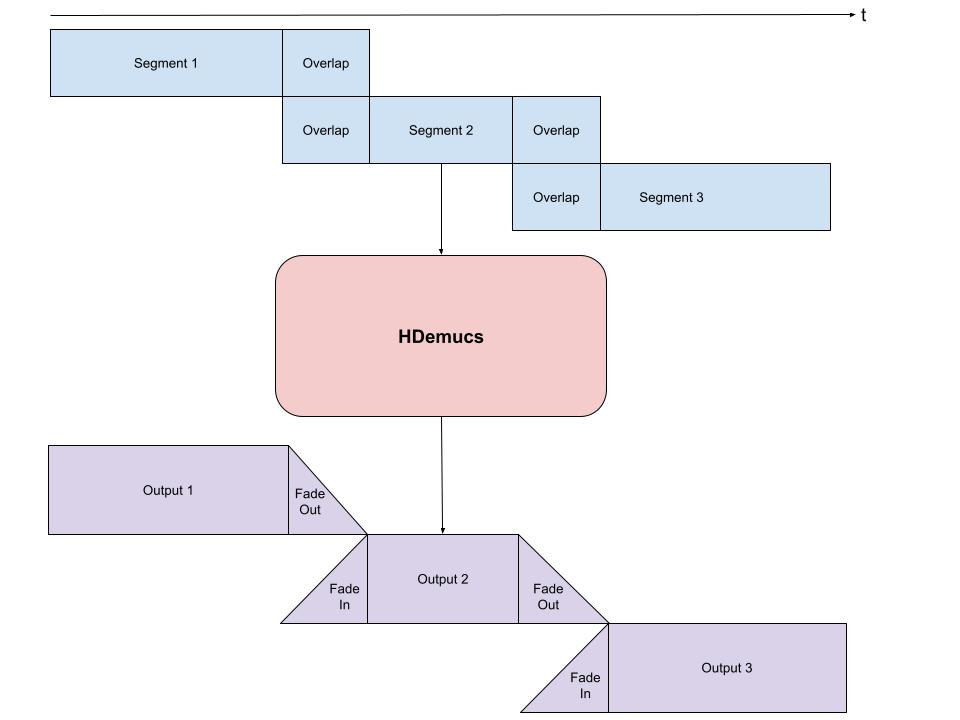
from torchaudio.transforms import Fade
def separate_sources(
model,
mix,
segment=10.0,
overlap=0.1,
device=None,
):
"""
Apply model to a given mixture. Use fade, and add segments together in order to add model segment by segment.
Args:
segment (int): segment length in seconds
device (torch.device, str, or None): if provided, device on which to
execute the computation, otherwise `mix.device` is assumed.
When `device` is different from `mix.device`, only local computations will
be on `device`, while the entire tracks will be stored on `mix.device`.
"""
if device is None:
device = mix.device
else:
device = torch.device(device)
batch, channels, length = mix.shape
chunk_len = int(sample_rate * segment * (1 + overlap))
start = 0
end = chunk_len
overlap_frames = overlap * sample_rate
fade = Fade(fade_in_len=0, fade_out_len=int(overlap_frames), fade_shape="linear")
final = torch.zeros(batch, len(model.sources), channels, length, device=device)
while start < length - overlap_frames:
chunk = mix[:, :, start:end]
with torch.no_grad():
out = model.forward(chunk)
out = fade(out)
final[:, :, :, start:end] += out
if start == 0:
fade.fade_in_len = int(overlap_frames)
start += int(chunk_len - overlap_frames)
else:
start += chunk_len
end += chunk_len
if end >= length:
fade.fade_out_len = 0
return final
def plot_spectrogram(stft, title="Spectrogram"):
magnitude = stft.abs()
spectrogram = 20 * torch.log10(magnitude + 1e-8).numpy()
_, axis = plt.subplots(1, 1)
axis.imshow(spectrogram, cmap="viridis", vmin=-60, vmax=0, origin="lower", aspect="auto")
axis.set_title(title)
plt.tight_layout()
5. Run Model
Finally, we run the model and store the separate source files in a directory
As a test song, we will be using A Classic Education by NightOwl from
MedleyDB (Creative Commons BY-NC-SA 4.0). This is also located in
MUSDB18-HQ dataset within
the train sources.
In order to test with a different song, the variable names and urls below can be changed alongside with the parameters to test the song separator in different ways.
# We download the audio file from our storage. Feel free to download another file and use audio from a specific path
SAMPLE_SONG = download_asset("tutorial-assets/hdemucs_mix.wav")
waveform, sample_rate = torchaudio.load(SAMPLE_SONG) # replace SAMPLE_SONG with desired path for different song
waveform = waveform.to(device)
mixture = waveform
# parameters
segment: int = 10
overlap = 0.1
print("Separating track")
ref = waveform.mean(0)
waveform = (waveform - ref.mean()) / ref.std() # normalization
sources = separate_sources(
model,
waveform[None],
device=device,
segment=segment,
overlap=overlap,
)[0]
sources = sources * ref.std() + ref.mean()
sources_list = model.sources
sources = list(sources)
audios = dict(zip(sources_list, sources))
0%| | 0.00/28.8M [00:00<?, ?B/s]
57%|#####7 | 16.5M/28.8M [00:00<00:00, 92.3MB/s]
94%|#########3| 27.0M/28.8M [00:00<00:00, 87.3MB/s]
100%|##########| 28.8M/28.8M [00:00<00:00, 91.8MB/s]
Separating track
/pytorch/audio/ci_env/lib/python3.10/site-packages/torch/nn/modules/conv.py:306: UserWarning: Plan failed with a cudnnException: CUDNN_BACKEND_EXECUTION_PLAN_DESCRIPTOR: cudnnFinalize Descriptor Failed cudnn_status: CUDNN_STATUS_NOT_SUPPORTED (Triggered internally at /opt/conda/conda-bld/pytorch_1712608839953/work/aten/src/ATen/native/cudnn/Conv_v8.cpp:919.)
return F.conv1d(input, weight, bias, self.stride,
/pytorch/audio/ci_env/lib/python3.10/site-packages/torch/nn/modules/conv.py:456: UserWarning: Plan failed with a cudnnException: CUDNN_BACKEND_EXECUTION_PLAN_DESCRIPTOR: cudnnFinalize Descriptor Failed cudnn_status: CUDNN_STATUS_NOT_SUPPORTED (Triggered internally at /opt/conda/conda-bld/pytorch_1712608839953/work/aten/src/ATen/native/cudnn/Conv_v8.cpp:919.)
return F.conv2d(input, weight, bias, self.stride,
5.1 Separate Track
The default set of pretrained weights that has been loaded has 4 sources that it is separated into: drums, bass, other, and vocals in that order. They have been stored into the dict “audios” and therefore can be accessed there. For the four sources, there is a separate cell for each, that will create the audio, the spectrogram graph, and also calculate the SDR score. SDR is the signal-to-distortion ratio, essentially a representation to the “quality” of an audio track.
N_FFT = 4096
N_HOP = 4
stft = torchaudio.transforms.Spectrogram(
n_fft=N_FFT,
hop_length=N_HOP,
power=None,
)
5.2 Audio Segmenting and Processing
Below is the processing steps and segmenting 5 seconds of the tracks in order to feed into the spectrogram and to caclulate the respective SDR scores.
def output_results(original_source: torch.Tensor, predicted_source: torch.Tensor, source: str):
print(
"SDR score is:",
separation.bss_eval_sources(original_source.detach().numpy(), predicted_source.detach().numpy())[0].mean(),
)
plot_spectrogram(stft(predicted_source)[0], f"Spectrogram - {source}")
return Audio(predicted_source, rate=sample_rate)
segment_start = 150
segment_end = 155
frame_start = segment_start * sample_rate
frame_end = segment_end * sample_rate
drums_original = download_asset("tutorial-assets/hdemucs_drums_segment.wav")
bass_original = download_asset("tutorial-assets/hdemucs_bass_segment.wav")
vocals_original = download_asset("tutorial-assets/hdemucs_vocals_segment.wav")
other_original = download_asset("tutorial-assets/hdemucs_other_segment.wav")
drums_spec = audios["drums"][:, frame_start:frame_end].cpu()
drums, sample_rate = torchaudio.load(drums_original)
bass_spec = audios["bass"][:, frame_start:frame_end].cpu()
bass, sample_rate = torchaudio.load(bass_original)
vocals_spec = audios["vocals"][:, frame_start:frame_end].cpu()
vocals, sample_rate = torchaudio.load(vocals_original)
other_spec = audios["other"][:, frame_start:frame_end].cpu()
other, sample_rate = torchaudio.load(other_original)
mix_spec = mixture[:, frame_start:frame_end].cpu()
0%| | 0.00/1.68M [00:00<?, ?B/s]
100%|##########| 1.68M/1.68M [00:00<00:00, 97.0MB/s]
0%| | 0.00/1.68M [00:00<?, ?B/s]
100%|##########| 1.68M/1.68M [00:00<00:00, 156MB/s]
0%| | 0.00/1.68M [00:00<?, ?B/s]
100%|##########| 1.68M/1.68M [00:00<00:00, 96.2MB/s]
0%| | 0.00/1.68M [00:00<?, ?B/s]
100%|##########| 1.68M/1.68M [00:00<00:00, 125MB/s]
5.3 Spectrograms and Audio
In the next 5 cells, you can see the spectrograms with the respective audios. The audios can be clearly visualized using the spectrogram.
The mixture clip comes from the original track, and the remaining tracks are the model output
# Mixture Clip
plot_spectrogram(stft(mix_spec)[0], "Spectrogram - Mixture")
Audio(mix_spec, rate=sample_rate)
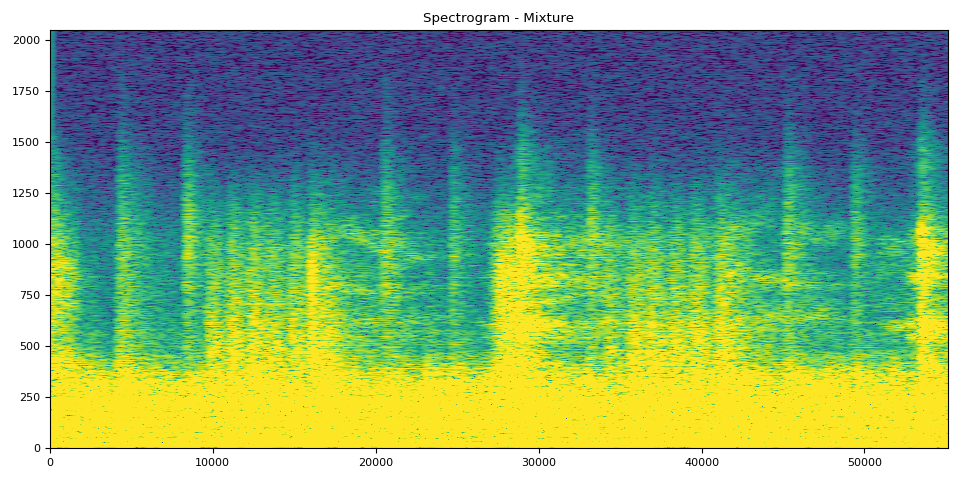
Drums SDR, Spectrogram, and Audio
# Drums Clip
output_results(drums, drums_spec, "drums")
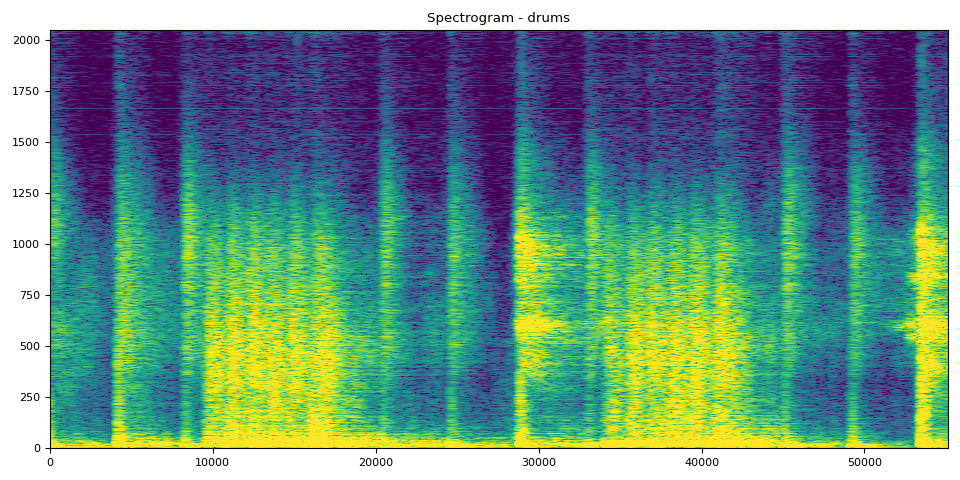
SDR score is: 4.964103512281138
Bass SDR, Spectrogram, and Audio
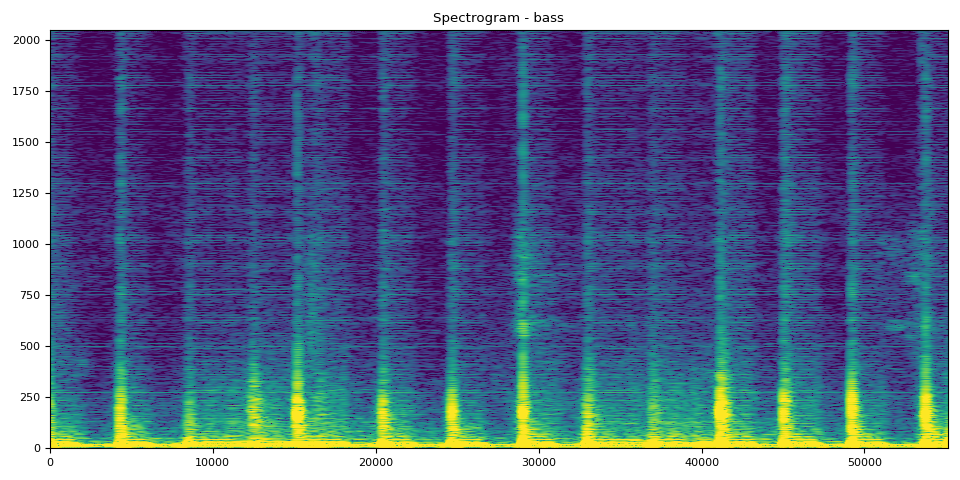
SDR score is: 18.905954431001057
Vocals SDR, Spectrogram, and Audio
# Vocals Audio
output_results(vocals, vocals_spec, "vocals")
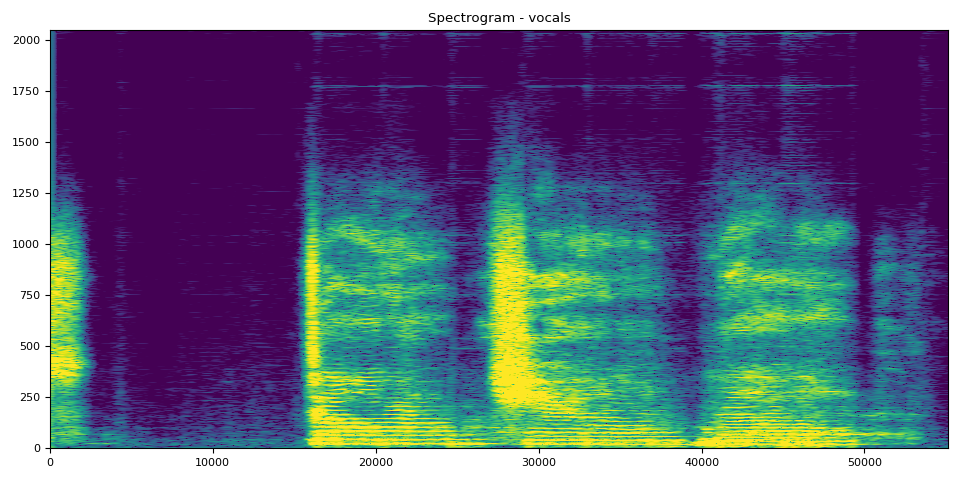
SDR score is: 8.792216836345062
Other SDR, Spectrogram, and Audio
# Other Clip
output_results(other, other_spec, "other")
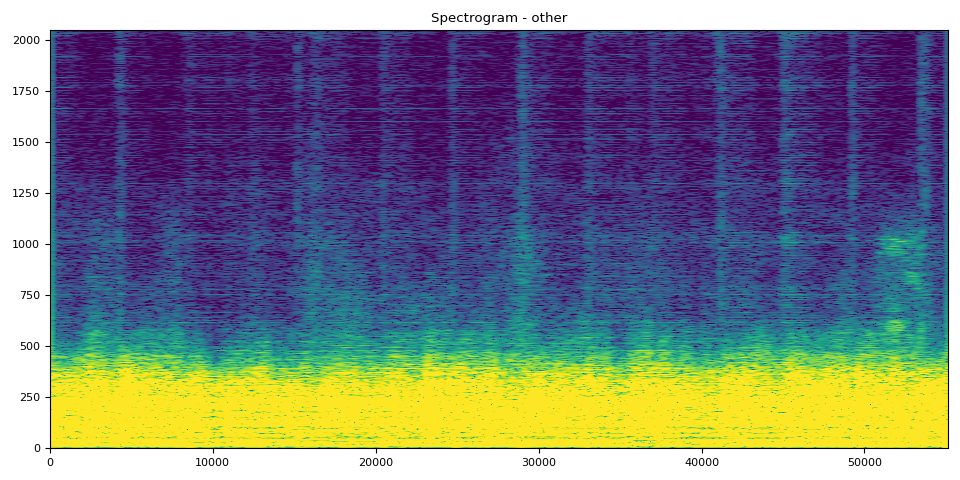
SDR score is: 8.866916703002428
# Optionally, the full audios can be heard in from running the next 5
# cells. They will take a bit longer to load, so to run simply uncomment
# out the ``Audio`` cells for the respective track to produce the audio
# for the full song.
#
# Full Audio
# Audio(mixture, rate=sample_rate)
# Drums Audio
# Audio(audios["drums"], rate=sample_rate)
# Bass Audio
# Audio(audios["bass"], rate=sample_rate)
# Vocals Audio
# Audio(audios["vocals"], rate=sample_rate)
# Other Audio
# Audio(audios["other"], rate=sample_rate)
Total running time of the script: ( 0 minutes 28.900 seconds)



